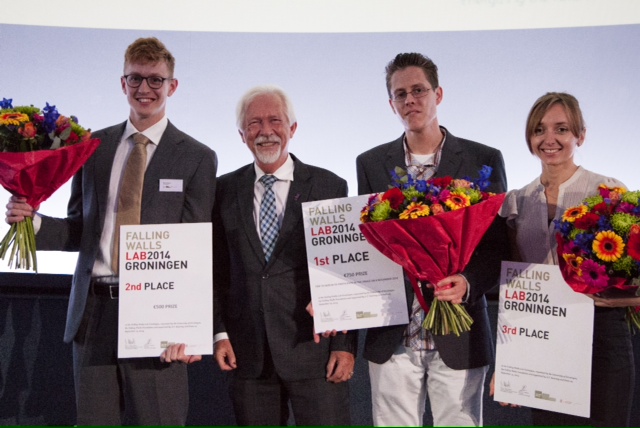RUG-student Andries de Vries wint Nederlandse voorronde Falling Walls
In het Infoversum in Groningen vond maandag 15 september de eerste Nederlandse aflevering plaats van het Falling Walls Lab. In een hoog tempo streden zeventien jonge onderzoekers en ondernemers om de hoogste eer: een plaats in de wereldfinale van Falling Walls Lab, die op 8 november a.s. plaatsvindt in Berlijn.
Het is op dat moment 25 jaar geleden dat de Muur viel. Om dat te vieren organiseert Falling Walls jaarlijks een reeks bijeenkomsten waarin innovatie, creativiteit en vrijheid van denken centraal staan. Personen jonger dan 35 jaar mogen in een pitch van drie minuten vertellen hoe muren gaan vallen: het kan daarbij gaan om een doorbraak op wetenschappelijk of maatschappelijk terrein. De voorrondes vinden plaats bij achttien topinstellingen over de hele wereld, van Los Angeles tot Johannesburg en van Peking tot Groningen.
Antibiotica
Onder de prachtige koepel van het Infoversum ging het over het oplossen van leesproblemen met een computergame, het nuttig gebruiken van uitgeperste sinaasappels en het gebruik van internet om het recht op gezondheid in China te versterken. Collegevoorzitter Sibrand Poppema van de Rijksuniversiteit Groningen kon de eerste prijs uitreiken aan Andries de Vries, student Energy and Environmental Sciences aan de Rijksuniversiteit Groningen. Hij werd door de jury onder voorzitterschap van organisatiedeskundige en Rosalind Franklin-fellow Jennifer Jordan (een van de winnaressen in Berlijn in 2011) als winnaar aangewezen. De Vries zal de RUG-kleuren verdedigen tijdens de wereldfinale in Berlijn, met een pitch over een doorbraak bij het probleem dat antibiotica steeds minder effectief worden.

Meer nieuws
-
17 februari 2026
De lange zoektocht naar nieuwe fysica
-
10 februari 2026
Waarom slechts een klein aantal planeten geschikt is voor leven
